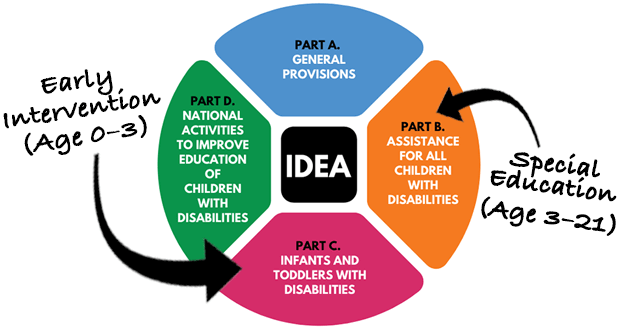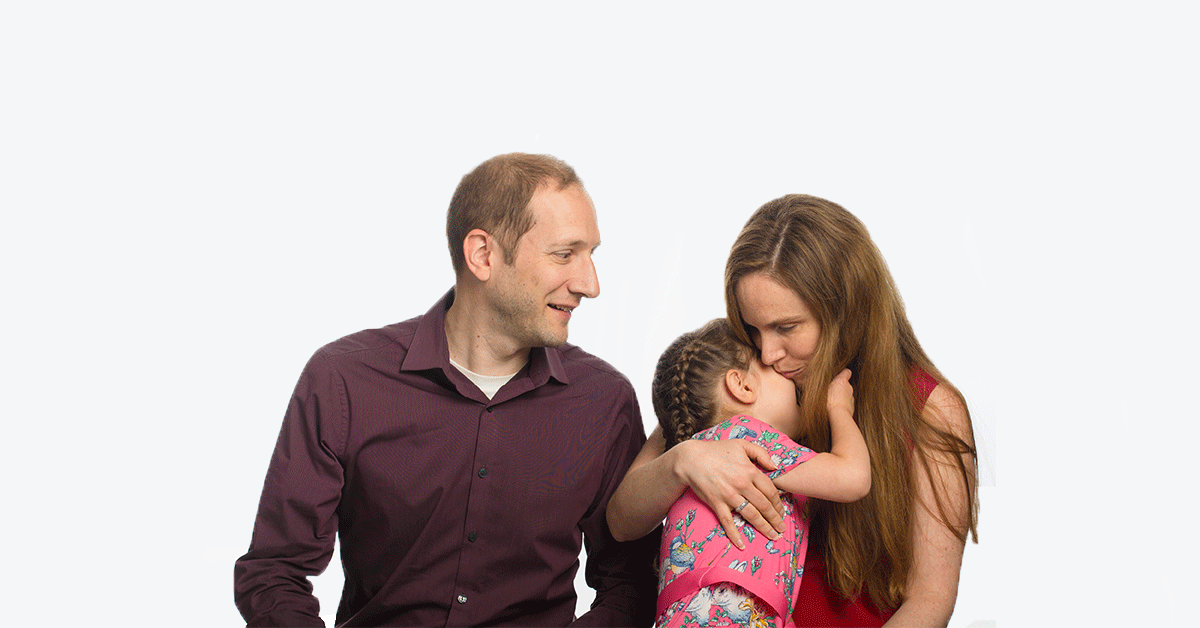Most people first hear about Fragile X when someone in their family is unexpectedly diagnosed:
- You may have been concerned about your child’s development for some time and just received a diagnosis of Fragile X syndrome.
- You have been unsuccessful in getting pregnant or have chosen to do prenatal genetic testing and found out you have the Fragile X premutation.
- You are or know of an older male who has tremors, memory loss, or balance problems, and the cause has been diagnosed.
You are now trying to understand your or a loved one’s Fragile X diagnosis. While this can be difficult news, we’re so glad you’ve found us. We first want you to know that you can contact us at any time, and we encourage you to do so.
You Are Not Alone
We are here to help you. When you’re ready, there is a whole community that understands what you’re going through and will be here to provide guidance and support throughout your journey.
The Fragile X community is made up of families just like yours. Knowing that there are others impacted by Fragile X out in the world who share your challenges and triumphs can be incredibly empowering.
Visit Our Community Support Network: In addition to organizations and NFXF chapters, you can find community contacts. Community contacts are parents who have volunteered to be available to other parents and individuals who are new to Fragile X.
Find a Community Contact

The NFXF will be here for everything else. The NFXF was founded nearly 40 years ago, and as long as Fragile X exists, we are not going anywhere. Think of us as a safe place where you can always be yourself.
We have a lot of information to share with you. Let’s start with our top recommendations:
- Understand the diagnosis: You may have lots of thoughts and emotions racing through your head. Understanding more about this new part of your life can help, but you don’t have to learn it all at once. Go at your own pace, and remember we are here to help.
- See a genetic counselor: You can find a genetic counselor in many ways, including through a Fragile X clinic, but why is this important? Learn why and what to expect.
- Visit a Fragile X clinic: There are clinics with expertise specific to Fragile X syndrome and the Fragile X-associated conditions. Skip the “What’s Fragile X?” questions and instead find a safe place with the support you need.
- Access services: Your child has a right to early intervention and free, appropriate public education through the federal special education law, the Individuals with Disabilities Education Act (IDEA). Accessing these services is an important step in supporting your child with Fragile X syndrome.
- Tell others: There are many reasons to know how to explain Fragile X to others, including talking to your “typical” children and informing relatives of possible risks associated with the Fragile X premutation.
- Take care of yourself: Yes, we know “take care of yourself” is broad and maybe not helpful. But there are things you can do to focus on self-care as you walk into this new stage of life.
Understanding the Diagnosis
Understanding a new diagnosis is important, as your understanding will help you advocate for yourself or your loved one with Fragile X. We have summarized the Fragile X conditions here, and you can dive deeper into each. We have plenty of helpful resources to help you, your doctors, friends, and family learn about and understand Fragile X.
When you or someone in your family is told you are a “carrier” for a Fragile X mutation, many questions arise. Do you have a premutation or a full mutation? What does it mean for your health, your family, and your future? Does the size of your FMR1 gene matter?
Have You Seen a Genetic Counselor? A genetic counselor can answer many questions. You can find a genetic counselor in many ways, including through a Fragile X clinic, but why is this important? Learn why and what to expect.
 Fragile X is an umbrella term for a group of disorders caused by a genetic mutation of the FMR1 gene on the X chromosome. Everyone has the FMR1 gene, and most of us have 45 or fewer of what are called “CGG repeats.” People with between 55 and 200 repeats have the premutation, and people with 200 repeats or more have the full mutation, which is called Fragile X syndrome.
Fragile X is an umbrella term for a group of disorders caused by a genetic mutation of the FMR1 gene on the X chromosome. Everyone has the FMR1 gene, and most of us have 45 or fewer of what are called “CGG repeats.” People with between 55 and 200 repeats have the premutation, and people with 200 repeats or more have the full mutation, which is called Fragile X syndrome.
| FMR1 CGG Repeats | Clinical Category | Clinical Features |
| 5-44 | Typical | None |
| 45-54 | Intermediate or “gray zone” | None, but may expand in future generations. |
| 55-200 | Premutation | No symptoms by itself, but can lead to FXTAS, primarily in males over 50, or FXPOI in females. |
| >200 | Full mutation | Fragile X syndrome, with or without autism. |
The Fragile X Premutation
Carriers of the Fragile X premutation can have no apparent symptoms, but are at risk of developing Fragile X-associated tremor/ataxia syndrome (FXTAS) or Fragile X-associated primary ovarian insufficiency (FXPOI).
What is the Fragile X Premutation?
FXTAS
Fragile X-associated tremor/ataxia syndrome — also referred to as FXTAS and pronounced fax-tass — is an adult-onset neurodegenerative disorder, more common in males than females with the FMR1 premutation. FXTAS is associated with tremors, balance problems, and other neurological signs. The risk of developing FXTAS in any given individual is influenced by their CGG repeat size, sex, and age.
FXPOI
Fragile X-associated primary ovarian insufficiency — also referred to as FXPOI, and pronounced fax-poy — is a condition in which the ovaries are not functioning at full capacity in a woman with the FMR1 premutation. FXPOI occurs in about 20% of women with the FMR1 premutation and can cause infertility, early menopause, and other ovarian issues.
Fragile X Syndrome
Fragile X syndrome — also referred to as FXS — is an inherited genetic condition caused by a full mutation of the FMR1 gene. FXS may cause intellectual disability, behavioral and learning challenges, and various physical characteristics. It is the leading, known inherited cause of intellectual disability and autism spectrum disorder. Though FXS occurs in both genders, males are more frequently affected than females. Life expectancy is not affected in people with FXS because there are usually no life-threatening health concerns associated with the condition.
You aren’t alone. At the end of the day, remember that your child is still the same wonderful, unique child you’ve loved since they were born. The diagnosis didn’t change that.
What will change is that you’ll learn about things you never knew existed. You’ll become a more understanding person. You’ll develop a love for your child that will amaze you. Your child learns differently than you do, but they can and will learn — with your help.
We often ask parents for their advice for newly diagnosed parents, and we have two of them to share with you:
Two Letters for Parents With a New Fragile X Syndrome Diagnosis
Seeing a Genetic Counselor
Fragile X is complex. Speaking to a genetic counselor is highly recommended.
A genetic counselor is a trained health care professional who will work side-by-side with you to educate, counsel, and guide you through this early part of your journey. This is your chance to ask as many questions as needed and get answers from an expert.
What else does a genetic counselor do? In addition to answering all your questions, your genetic counselor can make referrals to other providers for therapies, medical evaluations, family counseling, and emotional support for you and your family.
They’ll also guide you through understanding:
- Your or your loved one’s diagnosis.
- Facts and options for managing Fragile X.
- Symptoms of other Fragile X-associated conditions include infertility, early menopause, and adult-onset neurological or movement disorders.
- How to talk to your children (if any) and family, including helping them understand Fragile X.
- Reproductive issues and options for family planning.
- Fragile X inheritance patterns (how it gets passed down).
- The pros and cons of telling your relatives.
Learn more:
Genetic Counseling: Who, What & How
How to Find a Genetic Counselor
Ask your doctor or other health professional for a referral to a local genetic counselor. You may also:
- Visit a Fragile X Clinic: We recommend making an appointment at your nearest Fragile X clinic (more on clinics below). Fragile X clinics provide genetic counseling and medical services (including medication evaluations and consultations) supervised by a physician and supported by the latest medical, educational, and research knowledge available.
If you’re concerned about your ability to visit a Fragile X clinic for financial reasons, call the clinic and ask about the Fly With Me Fund. Learn more.
- Search the Find a Genetic Counselor Directory: The directory offers access to over 3,300 genetic counselors (US and Canada), and is made available by the National Society of Genetic Counselors.
- Contact Us: We can help.
Genetic Counseling and Family Support
Genetic counseling includes family and medical histories to assess the chance of carriers (premutations) throughout a family’s lineage.
Visiting a Fragile X Clinic
Visiting a Fragile X clinic can be life-changing. Fragile X specialists can help you and your family learn about and treat Fragile X. We can help you locate a clinic near you and learn what to expect and how to prepare.
What’s a Fragile X Clinic?
Fragile X clinics are part of the Fragile X Clinical and Research Consortium (FXCRC), which was created by us — the National Fragile X Foundation — in response to the growing needs of families living with Fragile X. The FXCRC is composed of 30-plus independently managed clinics across the U.S., each with teams that are knowledgeable about Fragile X. There are clinics that treat Fragile X syndrome, FXTAS, or both.
Why Visit a Fragile X Clinic?
- Fragile X clinics know and understand the difficulties families face when searching for the right services or service providers who have heard of Fragile X.
- Fragile X clinics can communicate with your local medical, therapy, and educational providers.
- Fragile X clinics are prepared to help support individuals and their families who are newly diagnosed, or if a crisis or new challenge arises.
What to Expect
We encourage families to visit the clinic closest to them, but in some cases, visiting a different clinic might be advisable based on the expertise of a specific healthcare provider.
Once you locate a clinic (review the list here), contact the clinic coordinator, who will guide you through the scheduling and paperwork process.
During your visit, you might meet with one member or a small number of clinic team members. You may be referred to other specialists in the hospital or medical network and may need to schedule follow-up appointments with them.
The clinician, often with the help of a genetic counselor, will work to understand your concerns. They will likely also try to understand what other family members may be at risk for or may be experiencing, and their possible relationship to Fragile X.
If the clinic is conducting or participating in a Fragile X-related research project, you may be asked if you’d like to consider participating. This is entirely optional, and declining will not impact the services you are provided.
We suggest scheduling a visit to an FXCRC clinic as soon as possible. Most clinics provide care to individuals with many different conditions, not just Fragile X. You may have to wait several months for an appointment at the Fragile X clinic, so the sooner that you schedule, the sooner you will be seen!
You may be asked to provide or share the following records at or in advance of the visit. Many healthcare records are now electronic; therefore, the clinician may already have access. Records requested may include:
- Fragile X test lab results
- Current or past medications
- Other relevant records (such as psychological, cognitive, ophthalmologic, or school)
Your Family History
If you have previously met with a genetic counselor, you may have already collected this information — but even if you haven’t, don’t worry, the clinic will let you know what information they need.
- Known diagnoses: For any individuals in your extended family with developmental delays, behavioral disorders, neurological disorders (including late onset FXTAS or FXPOI), and fertility issues.
- Medical records: Including genetic tests, pediatric, medical, or psychiatric records, or psychological, speech, and occupational therapy evaluations.
- Educational records: From school therapists or teachers.
Once your forms and records are reviewed, they will then work with you to schedule the appropriate appointments. Keep in mind that initial, comprehensive assessments may take more than one day or one visit. Learn more about what to expect from your first clinic visit: Your In-Person Visit to a Fragile X Clinic.
Accessing Services
For families in the U.S., the individual with Fragile X syndrome is eligible for services under the federal special education law, IDEA, the Individuals with Disabilities Education Act. IDEA ensures access to early intervention (ages 0–3) and later “appropriate” public education for eligible children with disabilities (ages 3–21).
Services are free (or at reduced cost) and available in every U.S. state or territory, though it’s important to know that each state has its own system for coordinating these services, including evaluation and eligibility requirements. Specific instructions are provided below.

Under IDEA, every child is eligible for a multidisciplinary evaluation to determine if they qualify for special education services. If the child qualifies, they will receive a personalized plan depending on their age. Learn more about each:
IDEA requires a multidisciplinary evaluation to determine if the child qualifies for special education services. This means that professionals from a variety of fields (such as medical, psychology, and occupational therapy) and the child’s parents collaborate to assess the child’s strengths and needs and determine appropriate educational services.
An individualized family service plan (IFSP) will be developed for children from birth to 36 months old. An individualized education program (IEP) will be developed for children ages 36 months to 21 years. Both of these programs specify the details of the individual’s educational plan. The plans should be created and executed in partnership with families and educators.
Intervention varies and is based on the child’s individual needs. Areas that may be addressed include: speech and language, cognition, behavior, sensory-motor, and academics. Settings range from home-based programs for infants to a variety of school-based classrooms for older children.
Contacting Your State’s Programs
- Part C: Ask your doctor or other professional concerned about your child’s development to connect you with your state’s early intervention program. If they can’t help you — a doctor’s referral is not required — you can contact your program directly. Find your state’s early intervention program.
- Part B: If your child is age 3 or older, call any local public elementary school and tell them you have concerns about your child’s development, and you would like them to be evaluated for preschool and special education services. If they can’t help you, ask to be connected to the school district’s special education director. Find your state’s Part B coordinator.
Learn more:
Learning, school, and education
Find more services:
Telling Others
Who do you want or need to explain this new diagnosis to? If you have other children, you’ll need to help them understand what’s going on. You’ll also need to tell your extended family.
Share “What is Fragile X?”
Our 90-second video can help get the conversation started. You can also share to various social media accounts.
If you’ve visited a genetic counselor, they’re specially trained to help explain complex genetic information in a way that is understandable to families and can help you with how to approach the subject and any recommended ongoing conversations. Here are some tips to get you started:
If explaining Fragile X to your child or children without Fragile X falls solely on you, we have found that many of the same strategies for the “sex talk” apply to the Fragile X talk. For children too young to understand this approach, creating an open dialogue within the family is a good first step.
Read more:
Talking with Your “Typical” Children About a Sibling’s Fragile X Syndrome Diagnosis
When informing relatives about Fragile X syndrome we again recommend working with your genetic counselor to develop a strategy for informing relatives and how to best approach the subject of diagnostic or carrier testing.
Please know that there may be a mix of reactions — including anger, guilt, blame, disbelief, or indifference — that are out of your control. We know that it can be challenging.
Difficult ethical situations can develop when a family member refuses to share information about Fragile X syndrome to at-risk relatives. In addition to identifying at-risk relatives, your counselor will work with you to inform family members and coordinate testing throughout the family.
Telling relatives about their risk of carrying or having Fragile X should happen sooner rather than later, but what if the earliest appointment to see a genetic counselor isn’t for another month, or longer? Should you wait that long to tell your family?
Depending on your extended family situation, you may be able to wait. But if not (if you’re not sure, ask us), another option is sending a letter that summarizes the situation and refers them to someone other than yourself for questions. We’ve found this to be the most stress-free solution, especially if you’re not comfortable talking to relatives.
Dear Family
We’ve provided a template to get you started. Ideally, you would refer them to your genetic counselor, but if you haven’t met with one yet, you can refer them to us, which we’ve included in the letter.
The letter is in Word format and may be altered to suit your situation. When using the template, keep in mind:
- It is not your responsibility to provide genetic counseling or to ensure your family members pursue testing.
- The letter in its original form is anonymous and does not refer to who the family member is that’s been diagnosed.
- You can sign your name in the letter, or it can be sent anonymously.
- If you need your relatives to help you locate other family members, include that information in the letter along with copies of an appropriate fact sheet that they can share with others. See our Fact Sheets and also our Fragile X 101 e-book.
We hope this helps you deal with the delicate nature of explaining this complex information to family members, some of whom you may not even know.
These conversations will most likely be very similar to what you tell your family, only without the complex emotions attached.
Whether it’s your child’s doctor or your own, you might start with how Fragile X affects you and then direct the doctor to our website at fragilex.org for more information. Depending on the current issues you or your loved one with Fragile X is facing, you may also want to bring information to give to the doctor. See our NFXF E-Books & PDFs.
If you are going to talk to young children about Fragile X, keep it short and simple. If you’re not sure at what level to talk, ask one of your friends or neighbors who has a child around the same age. Ask them what they would like to know about Fragile X.
If this is the first introduction to new classmates, bring a favorite toy or book so the other children see that your loved one is interested in the same things as they are. You might also consider sending a letter to the parents of the children in your child’s class. Not only will it educate them, but you can give them ideas on how and what to talk about with their own children.
As the children get older, gear your talk to what you think they’re ready for; you will get a good idea of this by the questions they ask.
Explaining Fragile X to Kids of All Ages
You could also remind any group you’re talking to that everyone has genes, including the FMR1 gene, they just work differently. The difference in how they work can result in someone having Fragile X. It’s a nice way to remind people we really aren’t that different.
You’ll want to keep this simple unless they ask you questions. You could also use our Fragile X awareness cards, which are simple business cards that direct them to our website for more information. Because of the website reference, you might also want to use this card in other situations, too, such as with teachers, medical professionals, and therapists.
Taking Care of Yourself
Whether you are a caregiver, loved one, or have found out that you have a Fragile X diagnosis, we recommend that you make taking care of yourself a priority. We know, easier said than done.
Your mind and body need breaks, and adding a few minutes of deep breathing to your daily routine can make a difference. What you’re going through right now can be hard … and confusing and overwhelming … and you’re perfectly normal if you’re also feeling angry, bitter, guilty, afraid — of the knowns and the unknowns — and yes, sad.
Breathing exercises have been proven to help with stress and anxiety symptoms. If you’re feeling like you need relief right now, try this:
- Stand up (or sit up straight and tall).
- Pull your shoulders back.
- Plant your feet evenly and widely apart.
- Open your chest.
- Breathe deeply.
What This Does: Deep breathing while in this position tells your body you’re not in danger at this moment. You should feel less helpless and a little more in control.
For this and other relaxation techniques, see from Inc.:
9 Ways to Get Rid of Anxiety in 5 Minutes or Less
Also see from Healthline:
8 Breathing Exercises to Try When You Feel Anxious
We hear a lot about self-care these days, but it can be hard to prioritize it when you are navigating big, heavy change. Focusing on your physical and mental health can lessen your stress and anxiety in the long run. We can’t emphasize this enough.
If you are a caregiver, part of your job is also caring for yourself. Think of it like when you’re a passenger on an airplane, and the flight attendant instructs you to put the oxygen mask on yourself before you put one on the person next to you. If you’re not there, who will put their mask on?
Signs & Tips for Managing Caregiver Stress
Signs of caregiver stress include:
- Feeling overwhelmed
- Feeling sad
- Constant worrying
- Feeling tired most of the time
- Getting too much sleep
- Not getting enough sleep
- Gaining weight
- Losing weight
- Easily angered or irritated
- Loss of interest in things you used to enjoy
- Frequent headaches or other physical pain
- Abuse of alcohol and other drugs
Tips for managing stress include:
- Accept help
- Focus on what you can provide to your child (no one’s perfect)
- Set realistic goals and break them down into smaller tasks
- Connect with others in your social circle, support groups, and resources to streamline some of your responsibilities
- Set healthy goals for yourself
- See a doctor or therapist
Read more from the Mayo Clinic:
Caregiver Stress: Tips for Taking Care of Yourself
The emotions you’re going through right now may be intense and new. How long they last will vary, and rather than ignoring them, try to acknowledge them. We promise, the intensity will lessen.
Read more:
Fragile X Syndrome Caregiving and Self-Care
Words of Advice From Parents
The following is a summary of ideas, suggestions, and encouragements from parents and other family members. Some are from surveys and others were posted on Facebook. Thank you, Fragile X community. You’re the best!
- The National Fragile X Foundation is a very safe place to find support.
- Don’t ever give up. It’s OK and it’s not your fault. Advocate, educate, and persevere.
- Don’t let other people tell you what to expect or how your child will act. Although there are some challenges, the possibilities are endless! I wouldn’t trade my brother for the world.
- It seems overwhelming, but it’s not. Be an advocate for your child. Make sure he or she receives all the therapies and love available. Change is very difficult as well. Keep a set schedule at home if possible (e.g., family sits down, together, for dinner every night).
- Breathe. Keep in mind that your child has really not changed. Your child is still the exact same beautiful child he or she was yesterday. The only difference is that you have a name and a reason (diagnosis) for some of the ways that your child is, and some of the challenges he or she will face.
- Hang in there. There is a lot of help out there – seek it out. It can be a roller coaster at times but so worth it.
- Take the time to grieve. It is OK (normal and even healthy) to grieve for the loss of what you expected your life to be like. You will still have a great life—it will just be a little different than what you expected. Resolve to write your story for yourself. It will help you heal. Know that grief may cycle back every now and then.
- Educate yourself about Fragile X. Don’t let yourself get too overwhelmed with what you read. Try to learn a little something each day. Then you can help educate others when you are ready.
- Do your research. There is help out there, so don’t stop looking! Be the best advocate you can be! Your voice matters!
- Get to know your child. Turn off your television, your computer, and your phone. Spend a little time each day seeing the world through your child’s eyes. You will learn so much from your child. Just play with your child and have fun. Laugh!
- There will be times when you feel sorry for your child. Try not to dwell on it. FXS is all your child knows, and most people who have it are very happy people. Remember that—especially in the difficult times when your child may not be so happy!
- Don’t worry about the future—focus on the present. When a child is first diagnosed, a parent’s first thoughts are often along the lines of: Will he live independently? Drive a car? Will the other kids at school make fun of him? Those things don’t matter right now, so don’t waste time worrying about them.
- Get as much information and support that you can. Go with your gut. You know your child better than anyone.
- Every child with Fragile X syndrome is different, so what works for one may not work for another. As much as possible, treat your child as if he or she can understand every word you say, because children get receptive language long before expressive language. Never give up on your child. All people—very much including those with FXS—continue to learn through their whole lives.
- Remember to enjoy being a parent. It’s OK not to do “everything.” Being a parent of any child can be exhausting! Do what you can do, do what is good for your family, and be happy with that. Allow breaks from therapies too — it is OK. You need to be a family. Make sure there is time for just plain old fun!
- Make time for yourself. Find a sport/hobby/activity that you enjoy and stick to it. Your child will benefit when you are healthier and happier!
- If you have a spouse, make time for him or her. Continue to build your relationship. Sure, you can be partners in advocating for your child, but you’re partners for each other, too. Don’t forget that.
- Don’t be alarmed. With patience, love, and understanding you can have a beautiful relationship with your child.
- Seek others who can support you and relate to your concerns and celebrations.
- #1. Choose joy. Always. #2. Seek out help (therapy, specialist, etc.) as quickly as possible.
- Take things slowly. Our children will teach us a whole lot of patience, resilience, and to be happy with the small things in life. You have lovely people with huge experience to advise you, a lot of resources to help you, and your kids to teach you how to teach them.
- Just love your child. You will find hope. You will find joy.
Contact Us
Real people are here for you!








We’re here Monday thru Friday, 9AM to 5PM ET, with the usual holidays as exceptions. Whether you call us or send us a message, one of our team members will get back to you.
Email: treatment@fragilex.org
Phone: (800) 688-8765
Submit a message:




